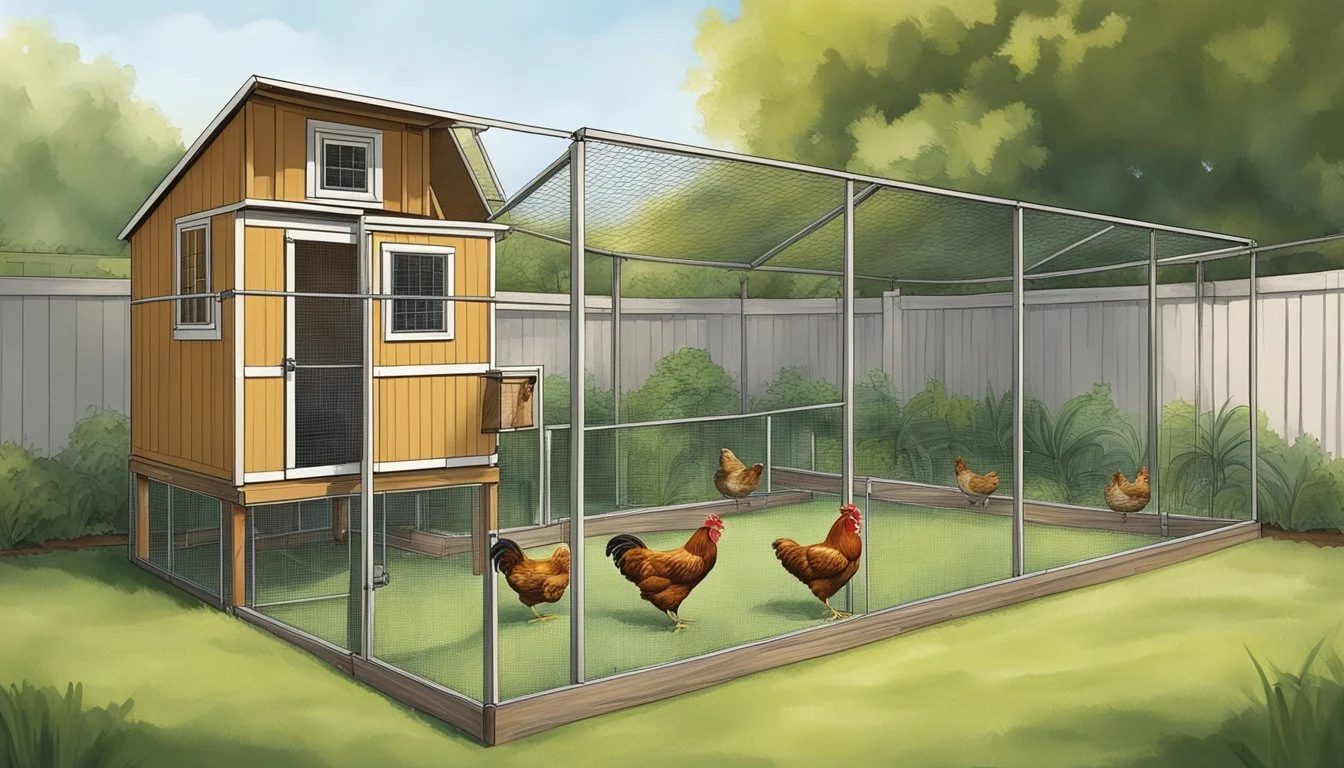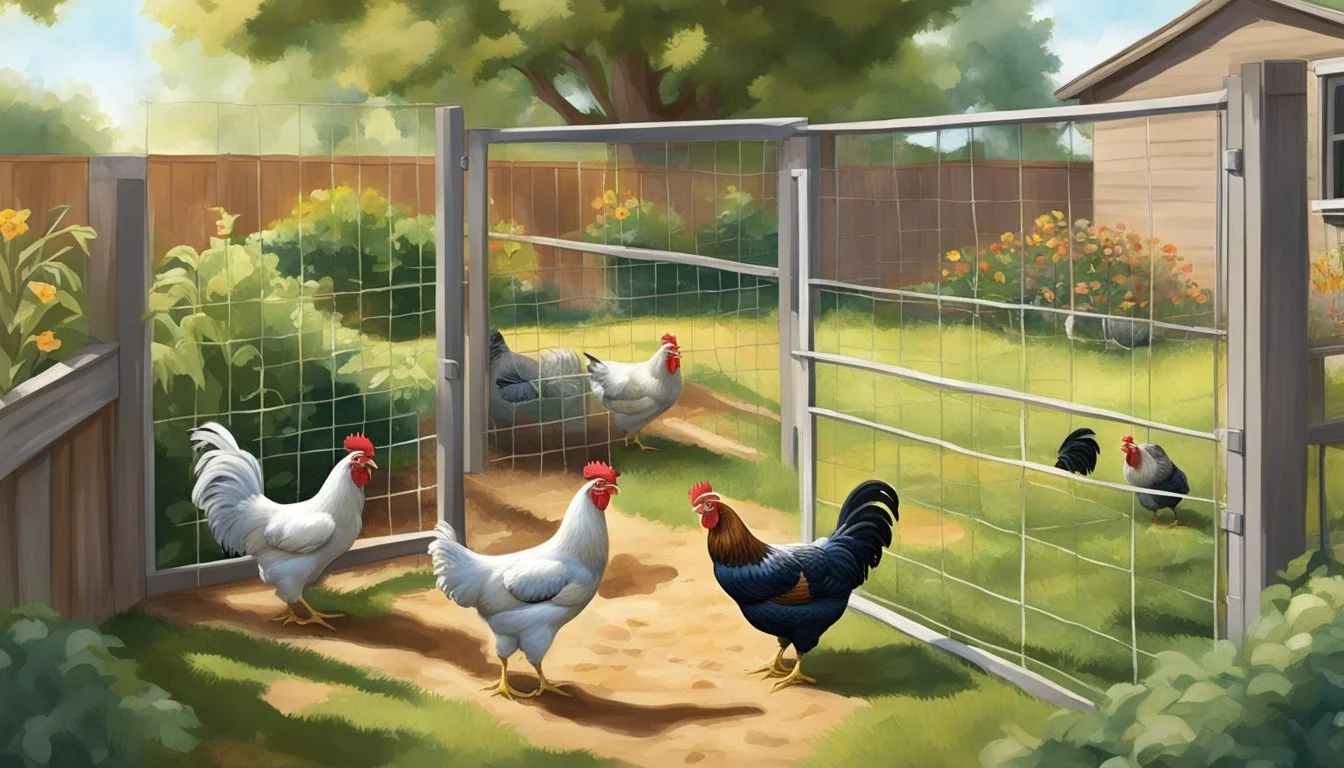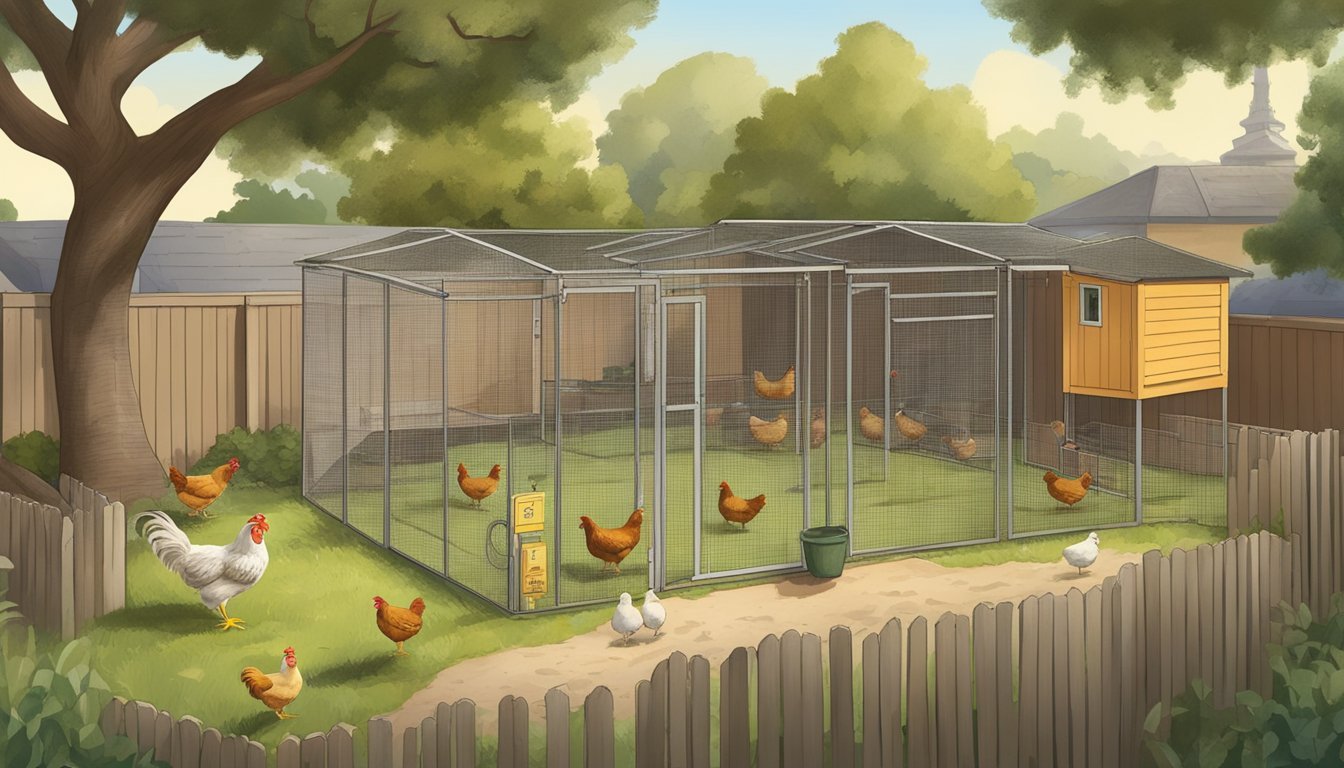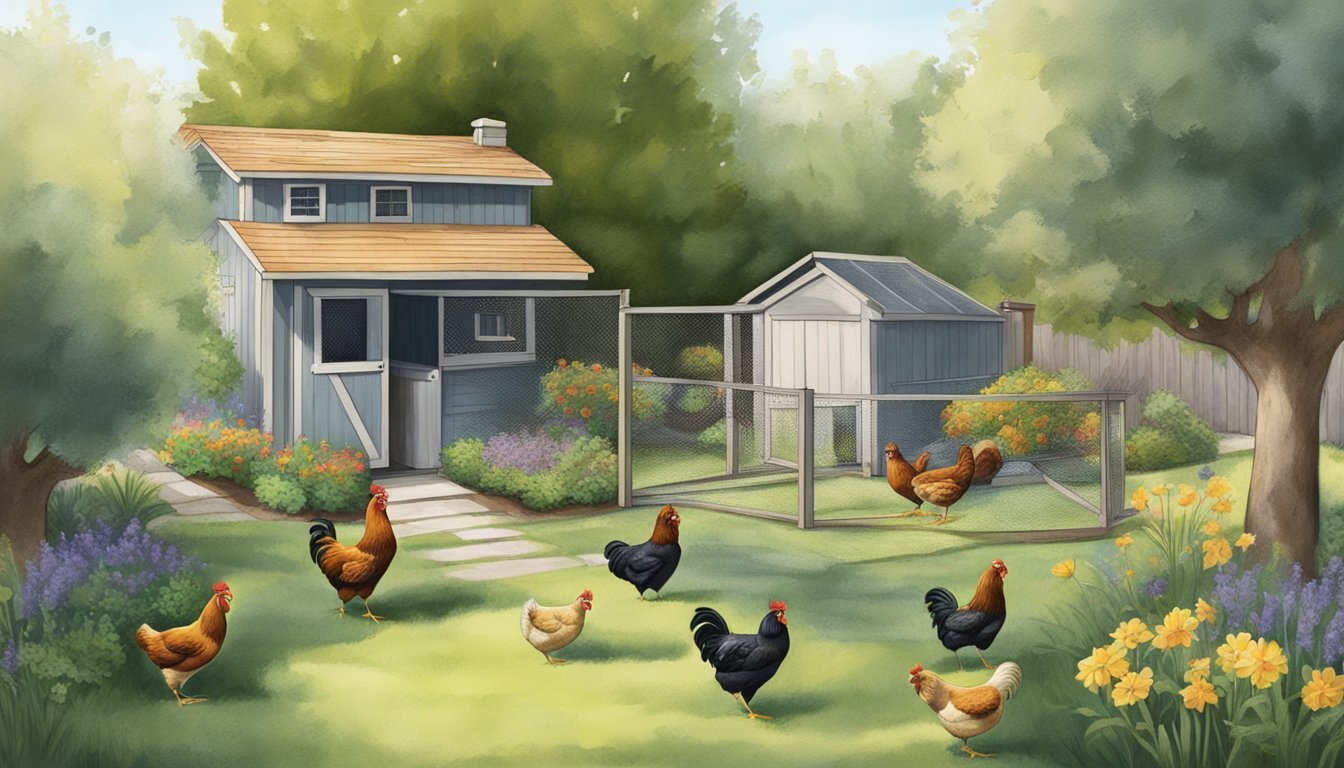Keeping Backyard Chickens in Pasadena, CA
Essential Guidelines for Urban Poultry Farmers
Keeping backyard chickens has become a popular endeavor among residents of Pasadena, California, providing a sustainable source of fresh eggs, natural pest control, and the enjoyment of caring for these animals. Careful considerations are taken by potential and current chicken owners regarding local ordinances which govern the keeping of backyard chickens. These regulations are designed to ensure the well-being of the chickens, minimize nuisances, and maintain harmony in residential areas.
In 2014, Pasadena City Council revised its chicken ordinance, demonstrating a responsiveness to the growing trend of urban poultry farming and the concerns of the community. Residents now have the ability to place their chicken coops closer to neighboring dwellings than was previously allowed, adhering to the updated distance requirement of 35 feet from any neighboring dwelling. This change illustrates Pasadena's commitment to adapting its urban agriculture policies in consideration of its residents' interests.
It is essential for residents to stay informed about the specifics of these regulations to successfully and legally raise backyard chickens. Understanding city ordinances is not only a legal responsibility but also a step toward fostering a community where backyard farming thrives within the framework of city living. In Pasadena, the effort to keep such practices accessible and community-friendly is evident in the adaptation of its local laws.
Pasadena Chicken Ordinance Overview
In Pasadena, CA, keeping backyard chickens involves compliance with specific local laws, obtaining necessary permits, and understanding property zoning regulations. These facets ensure the harmonious inclusion of chickens within urban settings.
Understanding Local Laws
Pasadena's municipal code regulates the keeping of chickens to align with the city's commitment to public health and safety. Familiarizing oneself with these local laws is a crucial step in responsibly raising chickens. The Municode lays out several restrictions to ensure minimal nuisance and promote animal welfare.
Permit Requirements and Restrictions
Obtaining a permit is often a prerequisite for keeping backyard chickens in urban environments. However, Pasadena residents are presently not required to obtain a permit for keeping chickens, provided they adhere to the stipulated restrictions. It's essential to stay updated as ordinances may evolve.
Property Regulations and Zoning
Ownership of chickens in Pasadena comes with defined property and zoning restrictions. The revised ordinance permits a chicken coop to be placed 35 feet from any neighboring dwelling, a change from the previous 50 feet requirement. This modification in the zoning ordinance aims to provide adequate space for coops while considering adjacent properties.
Please remember to refer to the current Pasadena Municipal Code for any updates or changes to the ordinances.
Setting Up Your Chicken Coop
When establishing a backyard chicken coop in Pasadena, CA, it's essential to select a functional coop design and determine the optimal location on your property, maintaining compliance with local ordinances for spacing.
Selecting the Right Coop Design
Selecting an appropriate coop design is crucial for the well-being of your chickens and the functionality of your space. Coops should be ventilated to ensure fresh air flow but also insulated enough to protect from weather extremes. Coops must include nesting boxes where chickens can lay eggs comfortably. It is also important that the coop is predator proof. Considering these specifications, the coop must accommodate the number of chickens with at least 2-3 square feet of space per chicken inside the coop.
Location and Space Considerations
The location of your chicken coop should adhere to Pasadena's specific zoning requirements. Coops need to be placed at least 35 feet away from neighboring dwellings. Ensure there's adequate space around the coop for chickens to roam, advising at least 8-10 square feet per chicken outside the coop. The coop should not be located directly on your property line or too close to any street line, to avoid nuisances or complaints from neighbors. The selected site should be level and well-drained to prevent water accumulation, which could lead to unsanitary conditions.
Chicken Care and Maintenance
Managing the health and wellbeing of backyard chickens in Pasadena requires diligence in feeding, cleanliness, and protection against predators.
Feeding and Nutrition
Chickens' sustenance is vital for their health and the quality of food products they produce. They should have access to a balanced diet consisting of commercial chicken feed, grains, and a variety of produce, which provides necessary vitamins and minerals. Offering calcium-rich options, like oyster shells, can be crucial for egg-laying hens to maintain strong shells.
Health and Cleanliness
Regular cleaning of the coop reduces the risk of disease and controls waste and smell. Coop floors should include absorbent materials like straw or wood shavings that are routinely changed. Moreover, one must monitor their chickens for signs of illness or distress and ensure they have plenty of fresh water. Implementing a schedule for vet visits helps maintain their overall health.
Protection from Predators
Secure housing is paramount to safeguard chickens from hawks, raccoons, and coyotes. The coop should have sturdy, impenetrable walls and a roof. Additional defenses include burying wire mesh around the perimeter and ensuring all potential openings are secure. A well-maintained enclosure helps prevent attacks, particularly during the night when predators are most active.
Understanding Chicken Behavior
In this section, we explore the intricacies of chicken behavior to ensure that backyard chicken keepers in Pasadena, CA can foster a healthy and engaging environment for their fowl friends.
Social Structure and Companionship
Chickens are inherently social creatures that establish a clear social structure, often referred to as a "pecking order." This hierarchy is crucial for maintaining order within a flock, and it influences feeding, nesting, and the interactions among chickens, roosters, and hens. Hens and roosters interact differently within the flock. Roosters typically assume the protector role, keeping a lookout for potential threats including predators like raccoons.
Importance of Companionship: Chickens thrive in the company of their own kind. Isolation can lead to behavioral issues and stress.
Observing Interactions: Careful observation of interactions can inform owners of each bird's position within the social hierarchy and help identify any disruptions or bullying.
Common Behaviors and Needs
Understanding common chicken behaviors is essential for identifying their needs and keeping them healthy and happy. Chickens exhibit a range of behaviors that signify their well-being or stress levels.
Feeding Patterns: Chickens show assertiveness in their feeding habits, with higher-ranking individuals often eating first.
Stress Signs: Stress in chickens may manifest as feather picking, decreased egg production, or aggressive pecking amongst flock members.
Comfort Indicators: A content chicken displays an upright and active posture, indicating ease and confidence within its environment.
Chickens require proper shelter, space for foraging, and protection from predators to fulfill their behavioral needs. They also benefit from environmental enrichment to satisfy their natural behaviors such as dust bathing and pecking. Responsible ownership includes acknowledging that roosters can be unexpected, often crowing at all times of day, and thus checking local ordinances regarding their keeping is important. In Pasadena, chickens allowed in backyard settings must have adequate space and secure enclosures to prevent unintended escape and to provide protection from predators. Newly introduced members, such as chicks or pullets, will also affect the social dynamics and should be monitored closely for integration into the flock.
Legal and Community Considerations
Navigating the regulations governing backyard chicken keeping in Pasadena, CA is essential for prospective and current owners to ensure harmony within the community and compliance with local laws.
Compliance with Maximum Numbers
The City of Pasadena stipulates a maximum of ten chickens allowed per household. This limit is set to balance the benefits of owning chickens with the potential impacts on neighbors and the local environment. Households must adhere to this regulation to avoid penalties.
Managing Noise and Nuisance
Chickens can create noise, which may lead to complaints from neighbors. To manage this, Pasadena regulations prohibit the keeping of roosters due to their loud crowing. Furthermore, chickens must be enclosed sufficiently to mitigate noise and prevent escape, ensuring they do not become a nuisance to the neighborhood.
Engaging with the Local Community
Communication with neighbors and engagement with the local government is pivotal. Owners should be proactive in addressing any concerns related to noise or nuisance. Participation in discussions with the city council can lead to revisions of ordinances, thereby reflecting the community’s needs and ensuring responsible chicken keeping practices.
Benefits of Backyard Chickens
Backyard chickens offer a personal source of high-quality eggs and meat, while contributing to sustainable living practices. These birds also provide educational opportunities and recreational enjoyment.
Eggs, Meat, and Sustainability
Eggs: Backyard chickens provide a steady supply of fresh eggs. Unlike commercially bought eggs, these eggs come from known sources, allowing for better control over their quality and the diet of the birds.
Meat: For those choosing to raise chickens for meat, these birds ensure a source of protein that is both healthier and more ethically raised compared to some store-bought options.
Sustainable Living: Keeping chickens supports sustainable practices as they can consume household food scraps, reducing waste. Their natural behaviors, such as scratching and pecking, help fertilize and aerate the soil.
Environmental Impact
Composting: Chickens contribute to a household's composting efforts, processing organic waste into nutrient-rich fertilizer.
Waste Reduction: With chickens consuming a variety of food scraps, they can significantly reduce a household's organic waste output.
Chicken Breeds: Different breeds of chickens can be chosen based on their egg-laying abilities, the quality of meat they produce, and their suitability to the local climate and environment.
Educational and Recreational Value
Educational: Families especially find that chickens are an excellent way to teach children about responsibility, animal care, biology, and the food cycle.
Recreational: The process of caring for chickens can be a relaxing and enjoyable pastime, often bringing a sense of fun and satisfaction to daily routines.
Interactive Experience
Raising chickens offers a hands-on experience that can be enjoyable and gratifying for people of all ages.
Variety of Activities
From building coops to choosing and raising different chicken breeds, backyard chickens provide a host of engaging activities that enhance the learning and recreational experience.
Additional Resources and Support
For residents of Pasadena interested in keeping backyard chickens, a number of resources and communities are available to provide support, legal guidance, and educational material to ensure a smooth and compliant experience.
Local Chicken Forums and Communities
Residents of Pasadena who are current or prospective chicken owners can find community support and discussions at the BackYard Chickens forum, specifically, the CluckinPasadena group. This is an invaluable place to connect with fellow poultry enthusiasts to share tips, experiences, and advices.
Forum: BackYard Chickens
Community Group: CluckinPasadena
Expert Contacts and Legal Advice
Those seeking expert advice can refer to the Pasadena Humane Society for legal guidelines related to backyard chickens. For specific legal inquiries and up-to-date regulations, contacting the Pasadena City Council or a local attorney knowledgeable in city animal ordinances can be of great assistance.
City/Organization: Pasadena Humane Society
Contact for city regulations: Pasadena City Council
Educational Material and Updates
It's important to stay informed about the latest developments regarding local chicken laws. The city's official website often posts updates, and ordinances can be found on their PDF Fact Sheets, which include comprehensive data about backyard hen advocacy and relevant public health information.
Updated Information Last Available: 2014
By leveraging these resources, Pasadena residents can enjoy the numerous benefits of backyard chicken keeping, while adhering to the local laws and contributing positively to the community.







